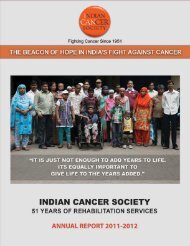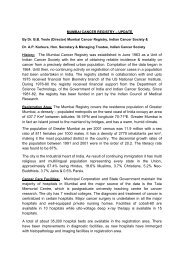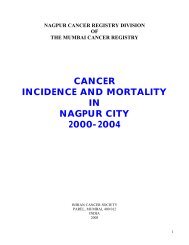The Rise and Rise of The Indian Cancer Society Rehabilitation Centre
The Rise and Rise of The Indian Cancer Society Rehabilitation Centre
The Rise and Rise of The Indian Cancer Society Rehabilitation Centre
You also want an ePaper? Increase the reach of your titles
YUMPU automatically turns print PDFs into web optimized ePapers that Google loves.
<strong>The</strong> <strong>Rise</strong> <strong>and</strong> <strong>Rise</strong> OF THE INDIAN CANCER SOCIETY<br />
REHABILITATION CENTRE<br />
SHEROO KHESWALLA<br />
<strong>The</strong> vision <strong>of</strong> two great men, Dr. D. J.Jussawala <strong>and</strong> Mr. Naval Tata led to the birth <strong>of</strong> the<br />
<strong>Indian</strong> <strong>Cancer</strong> <strong>Society</strong> in 1951. <strong>The</strong>ir mission was two fold, to exp<strong>and</strong> upon the cancer<br />
therapies available in India <strong>and</strong> to help <strong>and</strong> rehabilitate India’s poor <strong>and</strong> underprivileged<br />
cancer patients swarming the corridors <strong>of</strong> Tata Memorial Hospital.<br />
In India, it is estimated that at any given time there are 21 lakh people suffering from cancer<br />
<strong>of</strong> whom 6.4 lakh succumb to this disease every year. In the smaller cities <strong>of</strong> India, the<br />
facilities for treatment are practically non-existent <strong>and</strong> even in large cities like Mumbai,<br />
Chennai, Kolkata <strong>and</strong> Delhi the hospitals equipped to <strong>of</strong>fer treatment can hardly cope with<br />
the growing number <strong>of</strong> people including children suffering from this disease.<br />
A majority <strong>of</strong> cancer patients, by the time they reach a hospital, are already in great<br />
economic <strong>and</strong> emotional distress as most <strong>of</strong> their meagre resources are exhausted from<br />
expenditure on initial treatment in their home town <strong>and</strong> travel to a specialised treatment<br />
centre. Many <strong>of</strong> them are in an advanced state <strong>of</strong> the disease. <strong>The</strong> cost <strong>of</strong> prolonged<br />
treatment, sometimes lasting over 2-3 years is prohibitive. Illiteracy, ignorance <strong>and</strong> confusion<br />
in an alien environment add to their burden. Thus, it is <strong>of</strong> vital importance that these poor<br />
<strong>and</strong> extremely sick adults <strong>and</strong> children get care <strong>and</strong> guidance immediately.<br />
In 1962, the Social Service Research Unit <strong>of</strong> the <strong>Indian</strong> <strong>Cancer</strong> <strong>Society</strong> carried out a socioeconomic<br />
survey <strong>of</strong> cancer patients coming from the rural areas <strong>of</strong> Maharashtra <strong>and</strong> the<br />
neighbouring states to Tata Memorial Hospital for treatment. <strong>The</strong> results <strong>of</strong> the survey<br />
revealed that many poor people could not even afford to avail <strong>of</strong> the free treatment <strong>of</strong>fered<br />
by Tata Memorial Hospital due to the high cost <strong>of</strong> boarding <strong>and</strong> lodging in Mumbai. Hence,<br />
many <strong>of</strong> them returned to their villages without completing the full course <strong>of</strong> treatment,<br />
eventually succumbing to the disease.<br />
This scenario exists even today.<br />
Our Founders felt there was an urgent need to establish a comprehensive welfare <strong>and</strong><br />
rehabilitation service for these cancer patients. Thus, an experimental workshop was started<br />
by the <strong>Indian</strong> <strong>Cancer</strong> <strong>Society</strong> in one small corridor <strong>of</strong> the Tata Memorial Hospital in 1962.<br />
<strong>The</strong> objective in starting the workshop was to alleviate the economic <strong>and</strong> mental distress <strong>of</strong><br />
these poor patients coming to Mumbai from all parts <strong>of</strong> the country by giving them vocational<br />
training <strong>and</strong> small jobs. Through the considerable efforts <strong>of</strong> Dr. D. J. Jussawalla, Mr. Naval<br />
Tata <strong>and</strong> Dr. Usha Bhatt, this small idea <strong>of</strong> a single workshop in one small area <strong>of</strong> the<br />
hospital grew into a full-fledged <strong>Rehabilitation</strong> <strong>Centre</strong> at Parel, about a kilometre from the<br />
TMH in 1979, providing comprehensive rehabilitation & welfare services to the poor <strong>and</strong><br />
needy suffering from cancer.
Within a short time, the ICS <strong>Rehabilitation</strong> <strong>Centre</strong> was able to provide a variety <strong>of</strong> services<br />
which included meals <strong>and</strong> nutritional supplements, prostheses to poor patients, social<br />
services including counselling, guidance <strong>and</strong> financial aid towards treatment costs <strong>and</strong><br />
vocational <strong>and</strong> occupational training.<br />
In 1982, a Prosthetic <strong>and</strong> Orthotic Workshop was added. <strong>The</strong> unique aspect <strong>of</strong> this<br />
workshop lies in the fact that all the prostheses <strong>and</strong> aids & appliances are produced by<br />
cancer patients for other cancer patients <strong>and</strong> even for those who have lost limbs due to<br />
reasons other than cancer. Different types <strong>of</strong> breast <strong>and</strong> limb prostheses, crutches, callipers,<br />
support belts <strong>and</strong> colostomy sets are made at this one <strong>of</strong> a kind workshop <strong>and</strong> are sold to<br />
patients all over the country at a very nominal cost. <strong>The</strong> same are provided free <strong>of</strong> cost to<br />
the very poor.<br />
In addition to the Prostheses Workshop, the ICS <strong>Rehabilitation</strong> <strong>Centre</strong> houses additional<br />
workshops where patients are given vocational training to suit their individual needs. <strong>The</strong>y<br />
are taught dhurrie weaving <strong>and</strong> mat making, all sorts <strong>of</strong> stitching, bag making <strong>and</strong> printing.<br />
And for those who are unable to do any work due to ongoing chemotherapy <strong>and</strong> radiation,<br />
simple assembly jobs that involve only the slightest effort such as packing, rolling <strong>and</strong><br />
pasting are given.<br />
In 2007, the <strong>Indian</strong> <strong>Cancer</strong> <strong>Society</strong> in collaboration with St. Jude India Child Care <strong>Centre</strong>s<br />
set up 14 accommodation units for children suffering from cancer, along with their parents at<br />
the <strong>Rehabilitation</strong> <strong>Centre</strong>. Another 16 units were added in 2008. <strong>The</strong>se 30 units are<br />
completely free <strong>of</strong> cost <strong>and</strong> house the children in a safe <strong>and</strong> hygienic atmosphere so vital for<br />
their recovery, where they are cared for by a dedicated group <strong>of</strong> staff <strong>and</strong> volunteers.<br />
Today, the <strong>Rehabilitation</strong> <strong>Centre</strong> <strong>of</strong> the <strong>Indian</strong> <strong>Cancer</strong> <strong>Society</strong> is a hub <strong>of</strong> activity <strong>and</strong><br />
provides vocational training <strong>and</strong> sustenance to about 100 poor cancer patients/survivors<br />
every day giving them the chance to eke out a living with dignity away from the footpaths<br />
outside Tata Memorial Hospital, where many <strong>of</strong> them stay. With increasing survival rates,<br />
quality <strong>of</strong> survival assumes vital significance. <strong>The</strong> <strong>Rehabilitation</strong> <strong>Centre</strong> contributes greatly to<br />
the mental <strong>and</strong> economic well being <strong>of</strong> poor cancer patients. Saving a patient’s life is just not<br />
enough today. It is equally important to ensure that a poor cancer patient can subsequently<br />
lead a purposeful <strong>and</strong> productive life.<br />
<strong>The</strong> <strong>Rehabilitation</strong> <strong>Centre</strong> <strong>of</strong> the <strong>Indian</strong> <strong>Cancer</strong> <strong>Society</strong> is indeed a Beacon <strong>of</strong> Hope that<br />
strives, through its various activities, to spread the Light <strong>of</strong> Hope into the lives <strong>of</strong> our<br />
underprivileged brethren <strong>and</strong> children afflicted with cancer.






